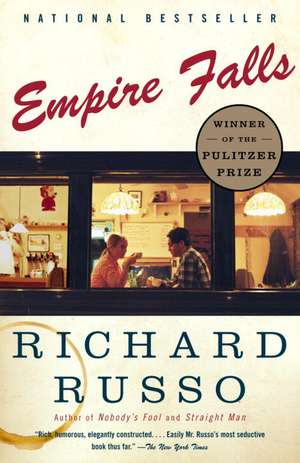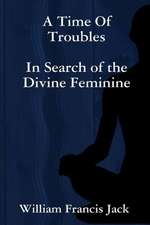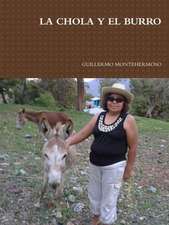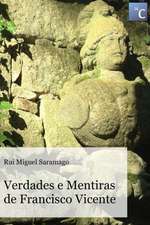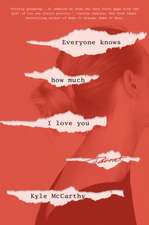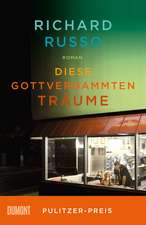Empire Falls: Vintage Contemporaries
Autor Richard Russoen Limba Engleză Paperback – 31 mar 2002
Vezi toate premiile Carte premiată
Miles Roby has been slinging burgers at the Empire Grill for 20 years, a job that cost him his college education and much of his self-respect. What keeps him there? It could be his bright, sensitive daughter Tick, who needs all his help surviving the local high school. Or maybe it’s Janine, Miles’ soon-to-be ex-wife, who’s taken up with a noxiously vain health-club proprietor. Or perhaps it’s the imperious Francine Whiting, who owns everything in town–and seems to believe that “everything” includes Miles himself. In Empire Falls Richard Russo delves deep into the blue-collar heart of America in a work that overflows with hilarity, heartache, and grace.
| Toate formatele și edițiile | Preț | Express |
|---|---|---|
| Paperback (2) | 55.83 lei 25-31 zile | +29.65 lei 6-12 zile |
| Random House – 9 mai 2002 | 55.83 lei 25-31 zile | +29.65 lei 6-12 zile |
| Vintage Publishing – 31 mar 2002 | 101.88 lei 22-36 zile |
Din seria Vintage Contemporaries
-
 Preț: 109.95 lei
Preț: 109.95 lei -
 Preț: 101.80 lei
Preț: 101.80 lei -
 Preț: 96.52 lei
Preț: 96.52 lei -
 Preț: 107.46 lei
Preț: 107.46 lei -
 Preț: 91.77 lei
Preț: 91.77 lei -
 Preț: 111.51 lei
Preț: 111.51 lei -
 Preț: 119.87 lei
Preț: 119.87 lei -
 Preț: 99.75 lei
Preț: 99.75 lei -
 Preț: 97.34 lei
Preț: 97.34 lei -
 Preț: 111.92 lei
Preț: 111.92 lei -
 Preț: 117.87 lei
Preț: 117.87 lei -
 Preț: 95.92 lei
Preț: 95.92 lei -
 Preț: 113.56 lei
Preț: 113.56 lei -
 Preț: 132.88 lei
Preț: 132.88 lei -
 Preț: 108.09 lei
Preț: 108.09 lei -
 Preț: 115.42 lei
Preț: 115.42 lei -
 Preț: 106.04 lei
Preț: 106.04 lei -
 Preț: 96.11 lei
Preț: 96.11 lei -
 Preț: 90.64 lei
Preț: 90.64 lei -
 Preț: 87.84 lei
Preț: 87.84 lei -
 Preț: 99.51 lei
Preț: 99.51 lei -
 Preț: 105.41 lei
Preț: 105.41 lei -
 Preț: 99.30 lei
Preț: 99.30 lei -
 Preț: 120.26 lei
Preț: 120.26 lei -
 Preț: 103.74 lei
Preț: 103.74 lei -
 Preț: 100.98 lei
Preț: 100.98 lei -
 Preț: 100.76 lei
Preț: 100.76 lei -
 Preț: 89.09 lei
Preț: 89.09 lei -
 Preț: 115.94 lei
Preț: 115.94 lei -
 Preț: 101.24 lei
Preț: 101.24 lei -
 Preț: 125.13 lei
Preț: 125.13 lei -
 Preț: 89.50 lei
Preț: 89.50 lei -
 Preț: 100.35 lei
Preț: 100.35 lei -
 Preț: 139.63 lei
Preț: 139.63 lei -
 Preț: 90.35 lei
Preț: 90.35 lei -
 Preț: 106.45 lei
Preț: 106.45 lei -
 Preț: 89.91 lei
Preț: 89.91 lei -
 Preț: 107.92 lei
Preț: 107.92 lei -
 Preț: 77.02 lei
Preț: 77.02 lei -
 Preț: 125.21 lei
Preț: 125.21 lei -
 Preț: 96.93 lei
Preț: 96.93 lei -
 Preț: 112.11 lei
Preț: 112.11 lei -
 Preț: 83.94 lei
Preț: 83.94 lei -
 Preț: 97.15 lei
Preț: 97.15 lei -
 Preț: 105.82 lei
Preț: 105.82 lei -
 Preț: 88.62 lei
Preț: 88.62 lei -
 Preț: 111.76 lei
Preț: 111.76 lei -
 Preț: 129.78 lei
Preț: 129.78 lei -
 Preț: 100.57 lei
Preț: 100.57 lei
Preț: 101.88 lei
Nou
Puncte Express: 153
Preț estimativ în valută:
19.49€ • 20.41$ • 16.13£
19.49€ • 20.41$ • 16.13£
Carte disponibilă
Livrare economică 17-31 martie
Preluare comenzi: 021 569.72.76
Specificații
ISBN-13: 9780375726408
ISBN-10: 0375726403
Pagini: 496
Dimensiuni: 136 x 204 x 26 mm
Greutate: 0.36 kg
Editura: Vintage Publishing
Seria Vintage Contemporaries
ISBN-10: 0375726403
Pagini: 496
Dimensiuni: 136 x 204 x 26 mm
Greutate: 0.36 kg
Editura: Vintage Publishing
Seria Vintage Contemporaries
Notă biografică
Richard Russo lives in coastal Maine with his wife and their two daughters. He has written five novels: Mohawk, The Risk Pool, Nobody’s Fool, Straight Man and Empire Falls, and a collection of short stories, The Whore's Child.
Extras
PROLOGUECompared to the Whiting mansion in town, the house Charles Beaumont Whiting built a decade after his return to Maine was modest. By every other standard of Empire Falls, where most single-family homes cost well under seventy-five thousand dollars, his was palatial, with five bedrooms, five full baths, and a detached artist's studio. C. B. Whiting had spent several formative years in old Mexico, and the house he built, appearances be damned, was a mission-style hacienda. He even had the bricks specially textured and painted tan to resemble adobe. A damn-fool house to build in central Maine, people said, though they didn't say it to him.Like all Whiting males, C.B. was a short man who disliked drawing attention to the fact, so the low-slung Spanish architecture suited him to a T. The furniture was of the sort used in model homes and trailers to give the impression of spaciousness; this optical illusion worked well enough except on those occasions when large people came to visit, and then the effect was that of a lavish dollhouse.The hacienda--as C. B. Whiting always referred to it--was built on a tract of land the family had owned for several generations. The first Whitings of Dexter County had been in the logging business, and they'd gradually acquired most of the land on both sides of the Knox River so they could keep an eye on what floated by on its way to the ocean, some fifty miles to the southeast. By the time C. B. Whiting was born, Maine had been wired for electricity, and the river, dammed below Empire Falls at Fairhaven, had lost much of its primal significance. The forestry industry had moved farther north and west, and the Whiting family had branched out into textiles and paper and clothing manufacture.Though the river was no longer required for power, part of C. B. Whiting's birthright was a vestigial belief that it was his duty to keep his eye on it, so when the time came to build his house, he selected a site just above the falls and across the Iron Bridge from Empire Falls, then a thriving community of men and women employed in the various mills and factories of the Whiting empire. Once the land was cleared and his house built, C.B. would be able to see his shirt factory and his textile mill through the trees in winter, which, in mid-Maine, was most of the year. His paper mill was located a couple miles upstream, but its large smokestack billowed plumes of smoke, sometimes white and sometimes black, that he could see from his back patio.By moving across the river, C. B. Whiting became the first of his clan to acknowledge the virtue of establishing a distance from the people who generated their wealth. The family mansion in Empire Falls, a huge Georgian affair, built early in the previous century, offered fieldstone fireplaces in every bedroom and a formal dining room whose oak table could accommodate upwards of thirty guests beneath half a dozen glittering chandeliers that had been transported by rail from Boston. It was a house built to inspire both awe and loyalty among the Irish, Polish and Italian immigrants who came north from Boston, and among the French Canadians, who came south, all of them in search of work. The old Whiting mansion was located right in the center of town, one block from the shirt factory and two from the textile mill, built there on purpose, if you could believe it, by Whiting men who worked fourteen-hour days, walked home for their noon meal and then returned to the factory, often staying far into the night.As a boy, C.B. had enjoyed living in the Whiting mansion. His mother complained constantly that it was old, drafty and inconvenient to the country club, to the lake house, to the highway that led south to Boston, where she preferred to shop. But with its extensive, shady grounds and its numerous oddly shaped rooms, it was a fine place to grow up in. His father, Honus Whiting, loved the place too, especially that only Whitings had ever lived there. Honus's own father, Elijah Whiting, then in his late eighties, still lived in the carriage house out back with his ill-tempered wife. Whiting men had a lot in common, including the fact that they invariably married women who made their lives a misery. C.B.'s father had fared better in this respect than most of his forebears, but still resented his wife for her low opinion of himself, of the Whiting mansion, of Empire Falls, of the entire backward state of Maine, to which she felt herself cruelly exiled from Boston. The lovely wrought iron gates and fencing that had been brought all the way from New York to mark the perimeter of the estate were to her the walls of her prison, and every time she observed this, Honus reminded her that he held the key to those gates and would let her out at any time. If she wanted to go back to Boston so damn bad, she should just do it. He said this knowing full well she wouldn't, for it was the particular curse of the Whiting men that their wives remained loyal to them out of spite.By the time their son was born, though, Honus Whiting was beginning to understand and privately share his wife's opinion, as least as it pertained to Empire Falls. As the town mushroomed during the last half of the nineteenth century, the Whiting estate gradually was surrounded by the homes of mill workers, and of late the attitude of the people doing the surrounding seemed increasingly resentful. The Whitings had traditionally attempted to appease their employees each summer by throwing gala socials on the family grounds, but it seemed to Honus Whiting that many of the people who attended these events anymore were singularly ungrateful for the free food and drink and music, some of them regarding the mansion itself with hooded expressions that suggested their hearts wouldn't be broken if it burned to the ground.Perhaps because of this unspoken but growing animosity, C. B. Whiting had been sent away, first to prep school, then to college. Afterward he'd spent the better part of a decade traveling, first with his mother in Europe (which was much more to that good woman's liking than Maine) and then later on his own in Mexico (which was much more to his liking than Europe, where there'd been too much to learn and appreciate). While many European men towered over him, those in Mexico were shorter, and C. B. Whiting especially admired that they were dreamers who felt no urgency about bringing their dreams to fruition. But his father, who was paying for his son's globe-trotting, finally decided his heir should return home and start contributing to the family fortune instead of squandering as much as he could south of the border. Charles Beaumont Whiting was by then in his late twenties, and his father was coming to the reluctant conclusion that his only real talent was for spending money, though the young man claimed to be painting and writing poetry as well. Time to put an end to both, at least in the old man's view. Honus Whiting was fast approaching his sixtieth birthday, and though glad he'd been able to indulge his son, he now realized he'd let it go on too long and that the boy's education in the family businesses he would one day inherit was long overdue. Honus himself had begun in the shirt factory, then moved over to the textile mill, and finally, when old Elijah had lost his mind one day and tried to kill his wife with a shovel, took over the paper mill upriver. Honus wanted his son to be prepared for the inevitable day when he, too, would lose his marbles and assault Charles's mother with whatever weapon came to hand. Europe had not improved her opinion of himself, of Empire Falls or of Maine, as he had hoped it might. In his experience people were seldom happier for having learned what they were missing, and all Europe had done for his wife was encourage her natural inclination toward bitter and invidious comparison.For his part, Charles Beaumont Whiting, sent away from home as a boy when he would've preferred to stay, now had no more desire to return from Mexico than his mother had to return from Europe, but when summoned he sighed and did as he was told, much as he always had done. It wasn't as if he hadn't known that the end of his youth would arrive, taking with it his travels, his painting and his poetry. There was never any question that Whiting and Sons Enterprises would one day devolve to him, and while it occurred to him that returning to Empire Falls and taking over the family businesses might be a violation of his personal destiny as an artist, there didn't seem to be any help for it. One day, when he sensed the summons growing near, he tried to put down in words what he felt to be his own best nature and how wrong it would be to thwart his true calling. His idea was to share these thoughts with his father, but what he'd written sounded a lot like his poetry, vague and unconvincing even to him, and he ended up throwing the letter away. For one thing he wasn't sure his father, a practical man, would concede that anybody had a nature to begin with; and if you did, it was probably your duty either to deny it or to whip it into shape, show it who was boss. During his last months of freedom in Mexico, C.B. lay on the beach and argued the point with his father in his imagination, argued it over and over, losing every time, so when the summons finally came he was too worn out to resist. He returned home determined to do his best but fearing that he'd left his real self and all that he was capable of in Mexico.What he discovered was that violating his own best nature wasn't nearly as unpleasant or difficult as he'd imagined. In fact, looking around Empire Falls, he got the distinct impression that people did it every day. And if you had to violate your destiny, doing so as a Whiting male wasn't so bad. To his surprise he also discovered that it was possible to be good at what you had little interest in, just as it had been possible to be bad at something, whether painting or poetry, that you cared about a great deal. While the shirt factory held no attraction for him, he demonstrated something like an aptitude for running it, for understanding the underlying causes of what went wrong and knowing instinctively how to fix the problem. He was also fond of his father and marveled at the little man's energy, his quick anger, his refusal to knuckle under, his conviction that he was always right, his ability to justify whatever course of action he ultimately chose. Here was a man who was either in total harmony with his nature or had beaten it into perfect submission. Charles Beaumont Whiting was never sure which, and probably it didn't matter; either way the old man was worth emulating.Still, it was clear to C. B. Whiting that his father and grandfather had enjoyed the best of what Whiting and Sons Enterprises had to offer. The times were changing, and neither the shirt factory, nor the textile mill, nor the paper mill upriver was as profitable as all once had been. Over the last two decades there had been attempts to unionize all the factories in Dexter County, and while these efforts failed--this being Maine, not Massachusetts--even Honus Whiting agreed that keeping the unions out had proved almost as costly as letting them in would've been. The workers, slow to accept defeat, were both sullen and unproductive when they returned to their jobs.Honus Whiting had intended, of course, for his son to take up residence in the Whiting mansion as soon as he took a wife and old Elijah saw fit to quit the earth, but a decade after C.B. abandoned Mexico, neither of these events had come to pass. C. B. Whiting, something of a ladies' man in his warm, sunny youth, seemed to lose his sex drive in frosty Maine and slipped into an unintended celibacy, though he sometimes imagined his best self still carnally frolicking in the Yucatán.Perhaps he was frightened by the sheer prospect of matrimony, of marrying a girl he would one day want to murder.Elijah Whiting, now nearing one hundred, had not succeeded in killing his wife with the shovel, nor had he recovered from the disappointment. The two of them still lived in the carriage house, old Elijah clinging to his misery and his bitter wife clinging to him. He seemed, the old man's doctor observed, to be dying from within, the surest sign of which was an almost biblical flatulence. He'd been turning the air green inside the carriage house for many years now, but all the tests showed that the old fossil's heart remained strong, and Honus realized it might be several years more before he could make room for his son by moving into the carriage house himself. After all, it would require a good year to air out even if the old man died tomorrow. Besides which, Honus's own wife had already made clear her intention never to move into the carriage house, and she lately had become so depressed by the idea of dying in Maine that he'd been forced to buy her a small rowhouse in Boston's Back Bay, where she claimed to have grown up, which of course was untrue. South Boston was where Honus had found her, and where he would have left her, too, if he'd had any sense. At any rate, when Charles came to him one day and announced his intention to build a house of his own and to put the river between it and Empire Falls, he understood and even approved. Only later, when the house was revealed to be a hacienda, did he fear that the boy might be writing poems again.Not to worry. Earlier that year, C. B. Whiting had been mistaken for his father on the street, and that same evening, when he studied himself in the mirror, he saw why. His hair was beginning to silver, and there was a certain terrier-like ferocity in his eyes that he hadn't noticed before. Of the younger man who had wanted to live and die in Mexico and dream and paint and write poetry there was now little evidence. And last spring when his father had suggested that he run not only the shirt factory but also the textile mill, instead of feeling trapped by the inevitability of the rest of his life, he found himself almost happy to be coming more completely into his birthright. Men had starting calling him C.B. instead of Charles, and he liked the sound of it.
From the Hardcover edition.
From the Hardcover edition.
Recenzii
“Rich, humorous, elegantly constructed . . . Easily Mr. Russo’s most seductive book thus far.”–The New York Times
“Russo writes with a warm, vibrant humanity.... A stirring mix of poignancy, drama and comedy.” —The Washington Post
“Russo is one of the best novelists around.” –The New York Times Book Review
“The history of American literature may show that Richard Russo wrote the last great novel of the 20th century.” –Christian Science Monitor
“Nobody does small-town life better than Richard Russo.” –Atlanta Journal-Constitution
“Russo writes with a warm, vibrant humanity.... A stirring mix of poignancy, drama and comedy.” —The Washington Post
“Russo is one of the best novelists around.” –The New York Times Book Review
“The history of American literature may show that Richard Russo wrote the last great novel of the 20th century.” –Christian Science Monitor
“Nobody does small-town life better than Richard Russo.” –Atlanta Journal-Constitution
Descriere
In this droll, unsentimental, and occasionally hilarious bestselling novel, Russo tells the story of a big-hearted man who becomes the unlikely hero of a small town with a glorious past but a dubious future.
Premii
- Book Sense Book of the Year Award Nominee, 2002
- Pulitzer Prize Winner, 2002
- Ambassador Book Awards Winner, 2002
